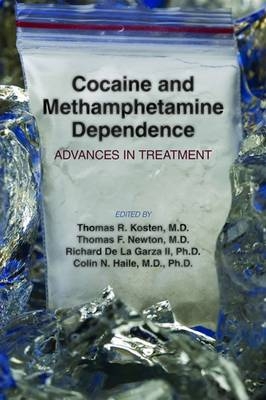
Cocaine and Methamphetamine Dependence
American Psychiatric Association Publishing (Verlag)
978-1-58562-407-2 (ISBN)
While the APA's Textbook of Addiction Psychiatry covers material that a general psychiatrist or primary care physician needs for the appropriate referral and initial management of stimulant dependence, Cocaine and Methamphetamine Dependence: Advances in Treatment goes beyond this basic knowledge and addresses the rapid evolution of both the understanding and the treatment of stimulant abusers. It also sheds light on how the epidemiology of cocaine, amphetamine and methamphetamine abuse and dependence have substantial differences in geographic distribution both here and abroad, and how treatments are evolving to help these complex patients benefit from emerging pharmacological and behavioral therapies.
Cocaine dependence complications account for one out of every three drug-related emergency room visits. Coroners' reports relate stimulants to the direct cause of death in 25% of cocaine overdoses and 68% of methamphetamine overdoses or as antecedents causing cardiovascular or medical problems leading to death in 20% of these abusers. Additionally, cocaine and methamphetamine abuse and dependence frequently co-occur with other major mental illnesses such as schizophrenia, major depression, and posttraumatic stress disorder. This makes a greater understanding of stimulant dependence among the psychiatric community an integral part of providing effective evaluation and treatment. Cocaine and Methamphetamine Dependence provides:
• An introduction of the DSM-5 plan to drop the distinction between abuse and dependence and add craving as a criterion.
• An overview of how the epidemiology of stimulant abuse is changing and pharmaceutical abuse is rising due to factors such as greater availability through family and friends who are increasingly being prescribed stimulants for conditions like weight loss or attention deficit disorder.
• The insight that even after long abstinence, stimulant users may remain vulnerable to amphetamine-induced psychosis, with delusions, paranoia and compulsive behavior.
• The insight that a comprehensive assessment of the patient involves the management of aberrant behaviors such as intoxication, violence, suicide, impaired cognitive function, and uncontrolled affective displays.
• A focus on treatment, emphasizing that the most important component of stimulant treatment involves behavioral therapies, often in combination with adjunctive medications.
• A review of the criminal justice system's shift away from punitive action and towards more human treatment, including the far-reaching benefits of medical management and treatment.
Fortunately, our understanding of stimulant abuse and dependence is growing at a time when a steady stream of new users and casualties is still accumulating. Constant vigilance regarding changes in epidemiology, fluctuations in drug availability, and changes in drug trafficking patterns are essential to recognition of new drug abuse patterns and their identification and treatment. Cocaine and Methamphetamine Dependence should be on the bookshelf of residents, physicians and psychiatrists who are highly likely to come into contact with one of the millions using and abusing stimulants today.
Thomas R. Kosten, M.D., is J.H. Waggoner Chair and Professor of Psychiatry, Pharmacology and Neuroscience and Associate Vice President and Dean for Clinical Research at the Baylor College of Medicine, Houston, Texas. He is also Professor of Psychiatry and Epidemiology at the M.D. Anderson Cancer Center, and Director, VA National Substance Use Disorders, Quality Enhancement Research Initiative (QUERI). Thomas F. Newton, M.D., is Professor of Psychiatry and Pharmacology at the Baylor College of Medicine and Michael E. DeBakey VA Medical Center, Houston, Texas. Richard De la Garza II, Ph.D., is Associate Professor of Psychiatry, Neuroscience, and Pharmacology at the Baylor College of Medicine and Michael E. DeBakey VA Medical Center, Houston, Texas. He is also Research Director and Associate Professor, Departments of Psychiatric Oncology and Behavioral Science, at the University of Texas M.D. Anderson Cancer Center. Colin N. Haile, M.D., Ph.D., is Assistant Professor of Psychiatry and Behavioral Sciences at the Baylor College of Medicine and Michael E. DeBakey VA Medical Center, Houston, Texas.
Contributors
Foreword
Chapter 1. Epidemiology and Psychiatric Comorbidity
Chapter 2. History, Use, and Basic Pharmacology of Stimulants
Chapter 3. Diagnoses, Symptoms, and Assessment
Chapter 4. Behavioral Interventions
Chapter 5. Pharmacotherapy
Chapter 6. Polydrug Abuse
Chapter 7. HIV and Other Medical Comorbidity
Chapter 8. Summary and Future Directions
Index
| Erscheint lt. Verlag | 21.11.2011 |
|---|---|
| Zusatzinfo | 16 Tables, unspecified; 14 Line drawings, black and white; 3 Halftones, black and white |
| Verlagsort | VA |
| Sprache | englisch |
| Maße | 152 x 229 mm |
| Gewicht | 390 g |
| Themenwelt | Medizin / Pharmazie ► Medizinische Fachgebiete ► Suchtkrankheiten |
| ISBN-10 | 1-58562-407-1 / 1585624071 |
| ISBN-13 | 978-1-58562-407-2 / 9781585624072 |
| Zustand | Neuware |
| Haben Sie eine Frage zum Produkt? |
aus dem Bereich


